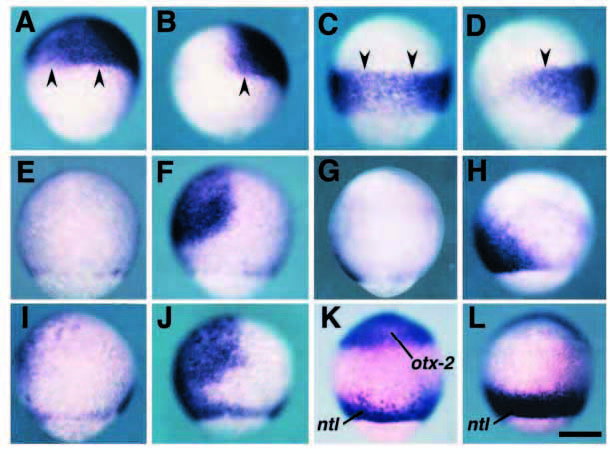Fig. 6 DN-BRIA causes the expansion of the neuroectoderm to the ventral part without any perturbation of the anterior-posterior pattern. At the 80% epiboly stage, embryos injected with mRNA encoding DN-BRIA (A,C,E,G,I,K) and b-galactosidase (B,D,F,H,J,L) were stained with the specific probes for otx-2 (A,B), hoxa-1 (C,D), gata-3 (E,F), eve-1 (G,H) and zbmp-2 (I,J). For the embryos shown in K and L, a mixture of probes for otx-2 and ntl was used. (A-J) Embryos are oriented with their dorsal side to the right and animal pole to the top; (K,L) ventral views with the animal pole at the top. In embryos injected with DN-BRIA mRNA, expression domains of anterior (otx-2, A) and posterior (hoxa-1, C) neuroectoderm marker genes expanded to the ventral part of the embryo, compared with the negative control embryos (B,D, stained with probes for otx-2 and hoxa-1, respectively). The posterior boundary of otx-2 and anterior boundary of hoxa-1 were maintained (arrowheads) in the DN-BRIA-injected embryos. By contrast, ventral nonneural ectodermal marker genes, gata-3 and eve-1, are reduced by the overexpression of DN-BRIA (E and G, respectively). Similarly, zbmp-2 is also reduced (I). This suggests that the neuralization of the ectoderm (A,C) and reduction of non-neural ectoderm (E,G) presented here results from the down-regulation of zbmp-2, caused by interference with the autoactivation process by DN-BRIA. (K,L) DN-BRIA cannot induce involuting dorsal mesoderm as revealed by the axis-like expression pattern of ntl even in the embryo in which neuroectoderm is expanded to the most ventral part. Scale bar, 200 μm.
Image
Figure Caption
Acknowledgments
This image is the copyrighted work of the attributed author or publisher, and
ZFIN has permission only to display this image to its users.
Additional permissions should be obtained from the applicable author or publisher of the image.
Full text @ Development

